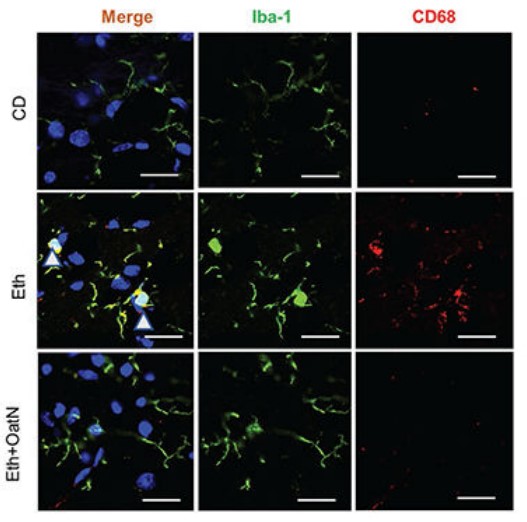Oat-derived Exosome Research and Application
As one of the popular healthy edible plants, oats derived exosomes have been found to exert effective effects on brain function and modulate neuroinflammation. Creative Biolabs with years of experience in providing services and products in the exosome field is capable of providing customized solutions for clients to carry out research on oat-derived exosomes.
Isolation of Oat-derived Exosomes
-
Dissolve oat bran meal with PBS through 37°C water bath
-
Collection of oat supernatant and removal of oat debris by multiple low speed centrifugations
-
Further differential centrifugation of oat juice
-
Ultracentrifugation to obtain oat exosome pellets
-
Purification of oat exosomes by density gradient centrifugation in aqueous iodosanol solution.
Research on Oat-derived Exosomes
|
Research
|
Conclusion
|
|
Biodistribution of oat-derived exosomes.
|
Oat-derived exosomes were administered orally to mice, and tracer fluorescent signals were detected in the mouse brain, liver, and peripheral blood, suggesting that oat-derived exosomes may be enriched in the brain region by oral administration.
|
|
Exploration of oat-derived exosome targeting of brain cells.
|
-
In a mouse model of fluorescently labeled oat exosomes administered orally, flow cytometry analysis revealed a population of cells containing fluorescent signals representative of exosomes that moderately expressed CD45 and highly expressed CD11b.
-
Furthermore, cells that were double-positive for both fluorescent signals representative of exosomes and Iba-1 were observed in brain tissue sections. These indicate that oat exosomes primarily target microglia in the CNS.
-
In addition, tracer analysis of fluorescent signals after depletion of brain macrophages with clodronate further confirmed the uptake of oat exosomes by microglia.
|
|
Oat-derived exosomes regulated ethanol-induced brain inflammation.
|
-
Ethanol stimulated greater enrichment of oat-derived exosomes across the blood-brain barrier in the brain.
-
Cytokine profiling results showed that oat-derived exosomes reduced inflammatory cytokine levels in the brain regions of alcohol-fed mice.
-
Quantitative ELISA results further confirmed that IL-1β, IL-6 and TNFα levels were significantly reduced in the brains of mice treated with oat-derived exosomes.
-
Oat-derived exosomes were found to inhibit the activation of microglia in nerves in both the ethanol-stimulated microglia model and the mouse model. Moreover, ethanol-induced inflammation in the liver, which is the main organ that metabolizes alcohol and uptakes oat-derived exosomes, was attenuated by oat-derived exosomes.
|
|
Oat-derived exosomes alleviated microglia-mediated neuronal cell injury.
|
Release of TNFα from ethanol-stimulated microglia induced neuronal cell apoptosis, whereas oat-derived exosome treatment was able to protect neuronal cells by inhibiting the expression of TNFα in ethanol-stimulated microglia and was able to improve memory in a mouse model of ethanol-stimulated brain injury.
|
|
Molecular mechanisms of oat-derived exosome uptake by microglia and avoidance of alcohol-induced brain impairment.
|
It was shown that oat-derived exosomes into microglia depend on preferential binding of oat β-glucan to hippocalcin by antibody sequestration and gene-specific knockout means, while the oat exosome's lipid digalactosyldiacylglycerol exerted an inhibitory effect on the binding of β-glucan to dectin-1.
β-glucan/hippocalcin further interacts with Rab11a and is recruited into the endosomal circulating compartment, and subsequently dectin-1 is separated from the endosomal circulating compartment to promote dectin-1 sorting into exosomes in a Rab11a-dependent manner, thereby inhibiting dectin-1-mediated subsequent NF-κB activation and proinflammatory cytokine secretion. Oat-derived exosomes avoid the pathogenesis of alcohol-induced brain damage and restore brain memory function through these cascading effects.
|
 Fig. 1 Oral administration of oat-derived exosomes inhibited ethanol-induced microglia activation in mouse brain.1
Fig. 1 Oral administration of oat-derived exosomes inhibited ethanol-induced microglia activation in mouse brain.1
Oat-derived exosomes carrying oat β-glucan exhibit lipid-lowering, antioxidant, and inflammation-reducing potential, contributing to the development of new strategies for the treatment of hyperlipidemia-related diseases and alcohol-stimulated neurodegenerative disorders. Creative Biolabs is equipped with advanced exosome research technology platforms to provide reliable services related to oat-derived exosomes to our clients. Please contact us to learn more.
Reference
-
Xu, Fangyi, et al. "Restoring Oat Nanoparticles Mediated Brain Memory Function of Mice Fed Alcohol by Sorting Inflammatory Dectin‐1 Complex Into Microglial Exosomes." Small 18.6 (2022): 2105385.
For Research Use Only. Cannot be used by patients.
Related Services:

 Fig. 1 Oral administration of oat-derived exosomes inhibited ethanol-induced microglia activation in mouse brain.1
Fig. 1 Oral administration of oat-derived exosomes inhibited ethanol-induced microglia activation in mouse brain.1









